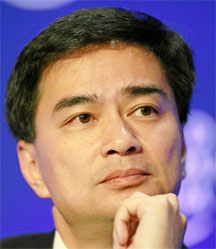BANGKOK, (Reuters) – Thailand’s opposition won a landslide election victory on Sunday, led by the sister of former Thai prime minister Thaksin Shinawatra in a triumph for red-shirt protesters who clashed with the army last year.

Exit polls showed Yingluck Shinawatra’s Puea Thai (For Thais) party winning a clear majority of parliament’s 500 seats, paving the way for the 44-year-old business executive to become Thailand’s first woman prime minister.
“I’ll do my best and will not disappoint you,” she told supporters after receiving a call of congratulations from her billionaire brother, who was ousted in a 2006 coup and lives in Dubai to avoid jail for graft charges that he says were politically motivated.
“He told me that there is still much hard work ahead of us,” she told reporters.
With nearly all votes counted, Yingluck’s party won a projected 261 seats with Prime Minister Abhisit Vejjajiva’s Democrat Party taking 162, according to the Election Commission.
Abhisit conceded defeat. “I would like to congratulate the Puea Thai Party for the right to form a government,” he said.

Exit polls by Bangkok’s Suan Dusit University showed Puea Thai doing even better, winning 313 seats compared to just 152 for the Democrats, dismal enough to threaten Abhisit’s job as party leader.
Yingluck’s supporters were jubilant, erupting in roars and cheers as television broadcast the exit polls.
“Number one Yingluck”, some shouted. “Prime Minister Yingluck” screamed others, as party members slapped each other on the back.
“Yingluck has helped us and now Puea Thai can solve our problems and they’ll solve the country’s problems,” said Saiksa Chankerd, a 40-year-old government worker.
The results were a rebuke of the traditional establishment of generals, old-money families and royal advisers in Bangkok who loathed Thaksin and backed Abhisit, an Oxford-trained economist who struggled to find a common touch.
“People wanted change and they got it,” said Kongkiat Opaswongkarn, chief executive of Asia Plus Securities in Bangkok. “It tells you that a majority of people still want most of the things that the ex-prime minister had done for the country in the past.”
The size of Puea Thai’s victory could usher in much-needed political stability after six years of sporadic unrest that featured the occupation of Bangkok’s two airports, a blockade of parliament, an assassination attempt and protests last year that descended into chaotic clashes with the army.
“Chances of blocking Puea Thai in the near term are severely limited,” said Roberto Herrera-Lim, Southeast Asian analyst at political risk consultancy Eurasia Group. “The instability everyone has been worried about now looks less likely. The military will have to be pragmatic now.”
RED SHIRT VILLAGES
Yingluck was feted like a rock-star by the red shirts who designated entire communities in Thailand’s rugged, vote-rich northeast plateau as “red shirt villages” to help mobilise supporters, each festooned with red flags and Thaksin posters.
“This win is very important because it will determine Thailand’s destiny,” said Kwanchai Praipana, a red-shirt leader in Udon Thani province, where the movement had set up hundreds of red villages in recent weeks.
The red shirts accuse the rich, the establishment and top military brass of breaking laws with impunity — grievances that have simmered since the 2006 coup — and have clamoured for Thaksin’s return.
Thaksin said he would “wait for the right moment” to come home. “If my return is going to cause problems, then I will not do it yet. I should be a solution, not a problem,” he told reporters in Dubai.
Thaksin, a former telecommunications tycoon, scored landslide election wins in 2001 and 2005 and remains idolised by the poor as the first politician to address the needs of millions living beyond Bangkok’s bright lights.
Yingluck electrified his supporters, ran a disciplined campaign and promised Thaksin-style populist policies, including a big rise in the national minimum wage and free tablet PCs for nearly one million school children.
